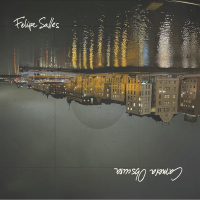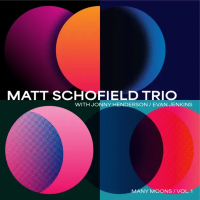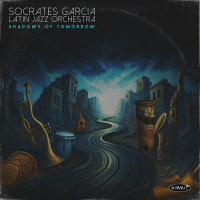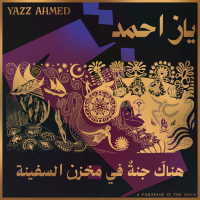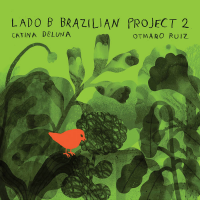Home » Jazz Articles » Multiple Reviews » Jazz, Gnu and New: ECM Reissues To Excite Vinyl Fans
Jazz, Gnu and New: ECM Reissues To Excite Vinyl Fans
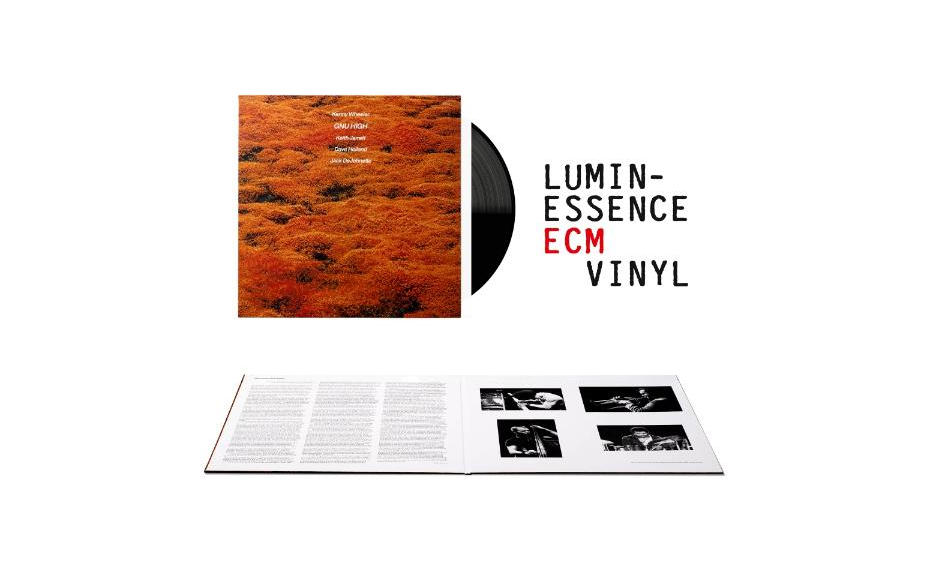
ECM's Luminessence series pays tribute to the impressive legacy of Manfred Eicher's label, founded in Germany in 1969. The vinyl pressings of classics by Kenny Wheeler, Gary Burton, Marilyn Crispell, and Annette Peacock are flat, glossy, and nearly flawless, and the sound that Eicher produced has never been more gorgeously present.

Keith Jarrett
pianob.1945

Kenny Wheeler
flugelhorn1930 - 2014

Gary Burton
vibraphoneb.1943

Marilyn Crispell
pianob.1947

Gary Peacock
bass, acoustic1935 - 2020

Paul Motian
drums1931 - 2011

Annette Peacock
vocals Kenny Wheeler
Kenny Wheeler Gnu High
ECM
1976
Canadian flugelhornist Kenny Wheeler may be jazz music's quintessential late bloomer. Born in 1930, he made his way to London to seek his musical fortune at the age of 22. From 1959-1965, he played as a member of

John Dankworth
saxophone1927 - 2010

Dave Holland
bassb.1946

Jack DeJohnette
drumsb.1942
It has been reported that Jarrett was not entirely comfortable with Wheeler's music, but that is not readily audible in the long, waltz tempo piece that fills Side 1, "Heyoke," named after a mythic Native American character. In fact, it is the pianist's playing that stands out the most: he solos throughout the three-part suite, including an astonishing middle interlude in which everyone else drops out as if spellbound by his musical expression. Wheeler contributes the breezy main theme and solos effectively in the first and last parts, varying his phrasing and tone to be alternately warm and round, then sharp and biting. DeJohnette and Holland alternate between propelling the piece forward and dissolving into exhilarating freedom, with the drummer capping the whole side off with an all-cymbal solo leading to Wheeler's final written theme. It's a mesmerizing 22-minute experience that is worth the price of admission alone. Side 2 features a comparatively short, elegantly swinging tune, "Smatter," with a typically excellent solo by the leader, followed by the 13-minute "Gnu Suite." This track begins with a slow ballad melody beautifully played by the composer, followed by his solo as DeJohnette introduces a loping 4/4 swing. The band drops out for Holland's solo in which he outlines and then embellishes the original melody with his distinctive, meaty bass tone, beautifully captured by engineer Tony May. Solos by Jarrett—again sounding completely in tune with the music's flow—and a light-footed DeJohnette lead to a final traipse through the main theme before the album comes to a close.
Alternately melodic and abstract, inventively composed and free, propulsive and suspended, Gnu High is an album that mesmerizes throughout. It sparked a decades-long association of Wheeler with ECM, resulting in nearly 30 albums right up to his death in 2014. Late bloomer or not, the support and respect that ECM gave him allowed Wheeler's talent to flower.
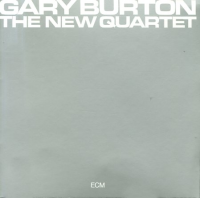 Gary Burton
Gary Burton The New Quartet
ECM
1973
After studying at the Berklee School of Music in the early 1960s, vibraphonist Gary Burton played with pianist

George Shearing
piano1919 - 2011

Stan Getz
saxophone, tenor1927 - 1991

Larry Coryell
guitar1943 - 2017

Steve Swallow
bassb.1940

Bob Moses
drumsb.1948

Mick Goodrick
guitar1945 - 2022
Harry Blazer
drums
Abe Laboriel
bass, electricb.1947
Abe Laboriel, Jr.
drums
Paul McCartney
bass, electricb.1942
The New Quartet's approach is not startlingly different from that taken on Burton's RCA and Atlantic records, but the times—mid '70s vs. late '60s—make all the difference. Blazer is clearly as much at home with a funky backbeat as he is with traditional swing, Laboriel solos with astonishing speed and melodic invention a year or two before

Jaco Pastorius
bass, electric1951 - 1987

Chick Corea
piano1941 - 2021

Soft Machine
band / ensemble / orchestrab.1966

Carla Bley
piano1938 - 2023
Mike Gibbs
composer / conductorThe New Quartet updated Burton's sound for a new decade and initiated an impressive run of albums for ECM that earned him the undisputed mantle of modern master of the vibraphone.
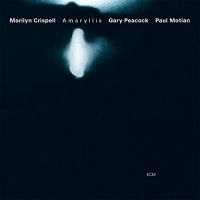 Marilyn Crispell
Marilyn Crispell Amaryllis
ECM
2001
American pianist Marilyn Crispell has forged a remarkable career exploring free playing in a wide variety of settings. Critics compared her early work to that of

Cecil Taylor
piano1929 - 2018

Anthony Braxton
woodwindsb.1945
Each trio member brought tunes to the February 2000 sessions at Avatar Studios in New York City. Peacock's "Voice from the Past," "Requiem," and "December Greenwings" are the most immediate. The bassist's compositional style typically incorporates strong, epigrammatic melodic phrases punctuated by dramatic pauses. The interplay between Peacock's deep-toned bass, Motian's decidedly non-linear percussion, and Crispell's playful piano soloing on "December Greenwings" is a highlight of the album, evoking the darting flight of birds hinted at by the title. Motian's "Conception Vessel/Circle Dance" medley deftly combines the title track of his 1973 ECM solo debut album with a tune he recorded in 1989 in a very different arrangement with

Bill Frisell
guitar, electricb.1951

Joe Lovano
drumsb.1952
In addition to the songs prepared for the session, producer Manfred Eicher also captured four stunning, completely free pieces that represent the most beautiful sounds on Amaryllis. Peacock begins the title track by establishing a harmonic framework that Crispell immediately grasps as if she had played it for years, while Motian provides intermittent brushwork on cymbals and snare. "Voices" and "M.E. (for Manfred Eicher)" begin as duets between Motian and Peacock, and here it is Crispell's turn to add a sparse accompaniment of ringing piano notes. "Avatar" is led by the piano, stating a wistful theme that Motian in particular seems to grasp immediately, matching Crispell's accents and rhythmic shifts beat for beat. These abstract performances demonstrate the players' astonishing ability to listen and complement each other in real time, and Eicher is to be commended for capturing such explorations for posterity. Two more forceful songs close the album: Motian's "Morpion," also found on his earlier Soul Note release, sounds like a boxing match between his drums and Crispell's piano, while Mitchell Weiss's gospel-tinged "Prayer" is perhaps the most straightforward tune here, with a gorgeous middle section where Crispell plays unaccompanied.
"Writing about music is like dancing about architecture," a wag (possibly Martin Mull) once said. This is rather apt when it comes to a recording like Amaryllis: difficult to describe or explain, its beauty must be experienced and enjoyed rather than analyzed.
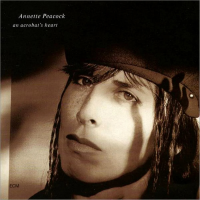 Annette Peacock
Annette Peacock An Acrobat's Heart
ECM
2000
"We play our own music/we sing our own songs/I made my own music for right or for wrong," sings Annette Peacock on the opening track of An Acrobat's Heart, "Mia's Proof." A more succinct statement of purpose could not be made for this singer, musician, composer, electronics pioneer, and inspiration to many other musicians, jazz or otherwise. At 19, Annette Coleman married bassist Gary Peacock and was immediately immersed in the whirlwind of the New York City avant-garde as her new husband played and toured with

Albert Ayler
saxophone, tenor1936 - 1970

Rahsaan Roland Kirk
woodwinds1935 - 1977
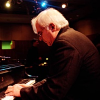
Paul Bley
piano1932 - 2016

David Bowie
vocals1947 - 2016

Bill Bruford
drumsb.1949
This double LP features Peacock's sparse but appropriate piano playing, along with the Cikada String Quartet, accompanying her purring, honeyed vocals on a set of songs exploring love, relationships in varying stages of dissolution, and a desire for personal freedom. So consistent are the lyrical themes and the musical framing—languid and gentle ballads, like jazz standards pared down to their minimal elements—that there are few highlights that stand out. Rather, it's best to hear the album as a suite of themes and variations, and there is no doubt that the sum total is beguiling. Peacock's lyrics are directly confessional: "Tho i love u darling, i love happiness more. . . Remember/how we grew into/the dream that lived/until we killed/love. . .No matter how I keep on trying/my thoughts won't stop about you. . .When you're not here/within me/the mem'ry/is all I can feel. . .My soul searches through universes for you, but I can't say/'I love you' out loud. Cause if I do, I might believe it too." Sonically, there are few touchstones. Perhaps some of the songs of Nick Drake, such as "Way To Blue," on which he was accompanied by strings, or

Elvis Costello
vocalsb.1954
Four very different albums, then, which provide a microcosm of the ECM label's vast catalog: ethereal, intellectual, abstract, and adventurous. The Luminessence series of reissues is a boon for vinyl fans, making it easy for listeners to hear ECM classics in pristine analog sound without endless crate digging for clean original copies. The mastering, pressing quality, and packaging are all superb, fully in keeping with ECM's reputation for quality. With new batches of titles being released several times a year, Luminessence seems set to delight jazz fans for years to come.
Tracks and Personnel
Gnu HighTracks: Heyoke; Smatter; Gnu Suite.
Personnel: Kenny Wheeler: flugelhorn; Keith Jarrett: piano; Dave Holland: bass; Jack DeJohnette: drums.
The New Quartet
Tracks: Open Your Eyes, You Can Fly; Coral; Tying Up Loose Ends; Brownout; Olhos De Gato; Mallet Man; Four Or Less; Nonsequence.
Personnel: Gary Burton: vibraphone; Mick Goodrick: guitar; Abe Laboriel: bass; Harry Blazer: drums.
Amaryllis
Tracks: Voice From The Past; Amaryllis; Requiem; Conceptio Vessel/Circle Dance; Voices; December Greenwings; Silence; M.E.; Rounds; Avatar; Morpion; Prayer.
Personnel: Marilyn Crispell: piano; Gary Peacock: bass; Paul Motian: drums.
An Acrobat's Heart
Tracks: Mia's Proof; Tho; Weightless; Over; As Long As Now; U Slide; Before U Said; The Heart Keeps; Ways It Isn't; Unspoken; Safe; Free The Memory; Ever 2 B Gotten; Camille; Lost At Last.
Personnel: Annette Peacock: vocals, piano; Cikada String Quartet
Tags
Multiple Reviews
Joshua Weiner
DL Media
Manfred Eicher
Keith Jarrett
Kenny Wheeler
Gary Burton
Marilyn Crispell
Gary Peacock
Paul Motian
Annette Peacock
ECM
John Dankworth
Dave Holland
Jack DeJohnette
Tony May
George Shearing
Stan Getz
Larry Coryell
Steve Swallow
Bob Moses
Mick Goodrick
Harry Blazer
Abe Laboriel
Abe Laboriel, Jr.
Paul McCartney
Jaco Pastorious
Chick Corea
Nucleus
Soft Machine
carla bley
Mike Gibbs
Cecil Taylor
anthony braxton
Bill Frisell
joe lovano
Mitchell Weiss
Albert Ayler
Roland Kirk
Paul Bley
David Bowie
Bill Bruford
Nick Drake
Elvis Costello
Comments
PREVIOUS / NEXT
Support All About Jazz
 All About Jazz has been a pillar of jazz since 1995, championing it as an art form and, more importantly, supporting the musicians who make it. Our enduring commitment has made "AAJ" one of the most culturally important websites of its kind, read by hundreds of thousands of fans, musicians and industry figures every month.
All About Jazz has been a pillar of jazz since 1995, championing it as an art form and, more importantly, supporting the musicians who make it. Our enduring commitment has made "AAJ" one of the most culturally important websites of its kind, read by hundreds of thousands of fans, musicians and industry figures every month.






 Buy Now
Buy Now





